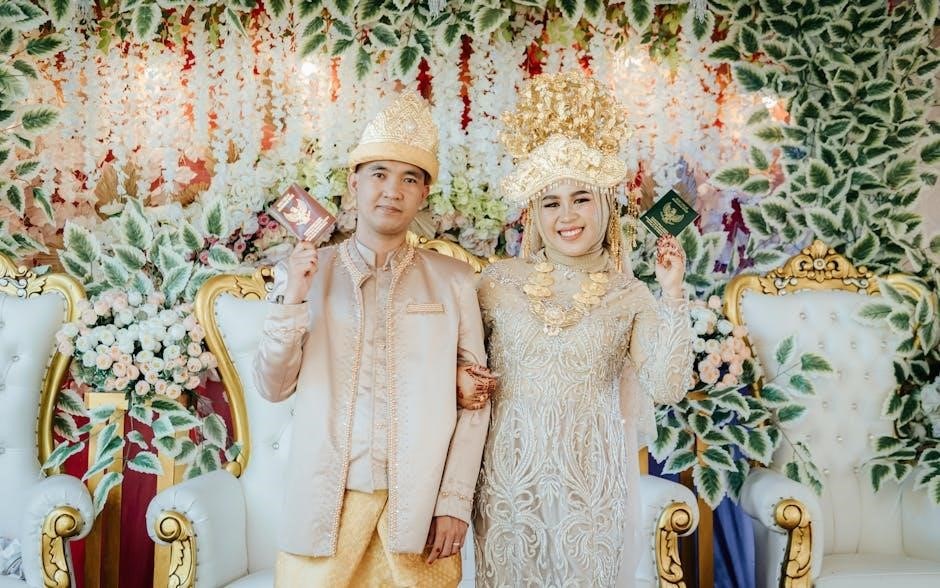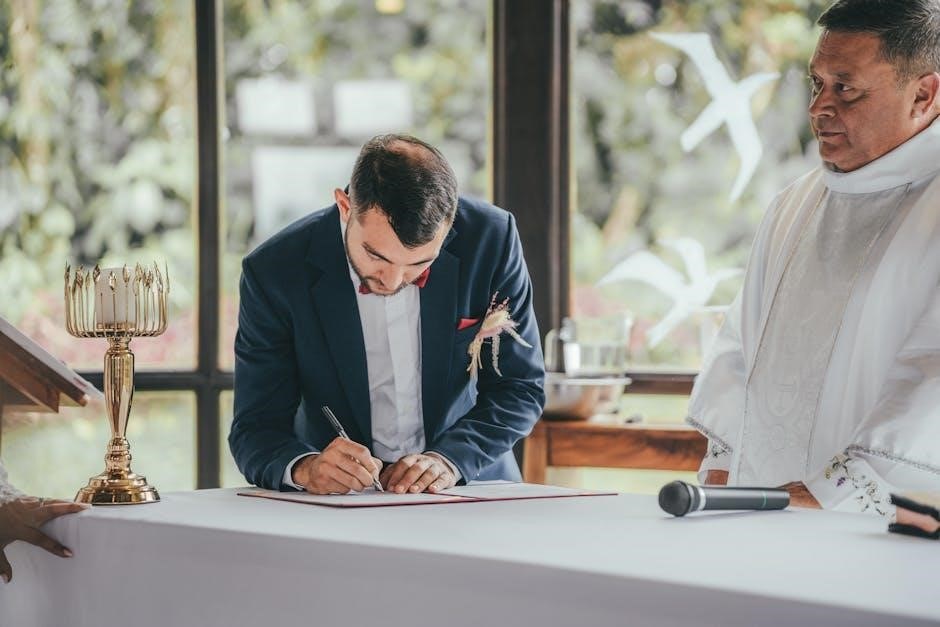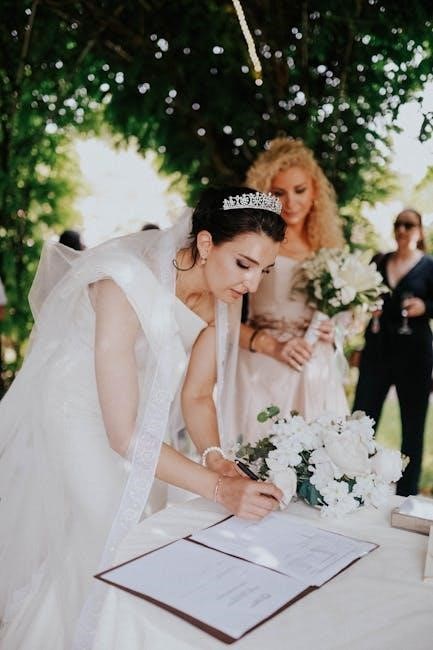Obtaining a Connecticut marriage license requires completing the official PDF application form, which streamlines the process for couples planning to marry in the state․
The PDF application is essential for providing required personal and legal information, ensuring compliance with state marriage laws and regulations․
While the form can be downloaded and completed in advance, applicants must still appear in person at the local vital records office to finalize their application․
Overview of the Marriage License Application Process in Connecticut
In Connecticut, the marriage license application process begins with obtaining the official PDF form from the town clerk’s office where the ceremony will take place; Couples must complete the form, gather required documents, and attend an in-person appointment․ The process ensures compliance with state regulations, and the license is valid for 65 days from issuance․ Proper preparation and submission of the PDF application streamline the process, ensuring timely approval․

Eligibility Criteria for Obtaining a Connecticut Marriage License
Couples must meet specific requirements, including age, residency, and legal capacity to marry․ Blood tests are not required, and both parties must appear in person to apply․
Age Requirements for Marriage in Connecticut
In Connecticut, individuals must be at least 18 years old to marry without parental consent․ Minors aged 16 or 17 require written consent from a parent or legal guardian․ Those under 16 cannot marry unless approved by a court․ The state recognizes same-sex marriages and ensures equal age requirements for all couples․ Marriage licenses are valid for 65 days from issuance, allowing couples to plan their ceremony within this timeframe․
Residency Requirements for Marriage License Applicants
In Connecticut, couples must apply for a marriage license in the town where the ceremony will take place․ There are no residency requirements for obtaining a license, but both parties must appear in person at the local vital records office․ Appointments are typically required, and the license is valid for 65 days from issuance․ Non-residents can marry in Connecticut as long as they meet all legal criteria․
Blood Test Requirements for Marriage in Connecticut
Connecticut does not require blood tests for marriage license applicants․ This simplifies the application process, as couples do not need to undergo medical testing before applying․ While blood tests are not mandated, applicants must still provide required documentation and meet other legal criteria to obtain a marriage license in Connecticut․

Required Documents for a Connecticut Marriage License Application
The application requires a valid photo ID, birth certificate, Social Security card, and divorce or death certificates if applicable․ Ensure all documents are up-to-date․
Identification Requirements for Marriage License Applicants
Applicants must provide valid photo identification, such as a driver’s license, state ID, or passport․ Both parties must appear in person with government-issued IDs․ Acceptable documents include U․S․ or foreign passports, military IDs, or permanent resident cards․ Ensure all IDs are current and valid, as expired documents may not be accepted․ Additional documentation may be required for non-citizens or non-residents․
Documents Needed for Non-Citizens or Non-Residents
Non-citizens or non-residents must provide valid government-issued photo identification and a certified copy of their birth certificate․ Additional documentation, such as a divorce decree or death certificate, may be required if previously married․ Ensure all foreign documents are accompanied by an official English translation․ Immigration documents, like a green card or visa, may also be requested to verify legal status․
Social Security Number Requirements
In Connecticut, both applicants must provide their Social Security Numbers (SSNs) when applying for a marriage license․ While the SSN itself is not printed on the license, it is required for administrative purposes․ Non-citizens without an SSN may need to provide alternative identification, but an ITIN is generally not accepted․ Ensure the information provided is accurate to avoid processing delays․

The Marriage License Application Process in Connecticut
The Connecticut marriage license application process requires both parties to appear in person at the town clerk’s office, providing necessary documentation and information for issuance․
How to Apply for a Marriage License in Person
To apply in person, both parties must visit the town clerk’s office where the marriage will occur․ Appointments are typically required and can be scheduled by phone or online․
Bring required documents, including photo identification, and complete the application form․ The process ensures all information is verified, and the license is issued promptly, valid for 65 days from the date of issuance․
Online or Mail-in Marriage License Application Options
Connecticut offers online applications for marriage licenses, allowing couples to initiate the process digitally․ However, both parties must still appear in person at the town clerk’s office to finalize the application and pay the fee․
Mail-in options are not typically available, as in-person verification is required․ Completing the PDF form online and printing it can expedite the in-person submission process, ensuring a smoother experience․ Please note that some towns may have specific requirements for online submissions․ Always check with the local office for details․ This ensures compliance with state regulations and avoids delays․
Appointment Requirements for Marriage License Applications
In Connecticut, marriage license applications typically require an appointment, as walk-ins are not always accepted․ Couples should contact the local town clerk’s office to schedule a time for their application․ This ensures a smooth process and avoids delays․
Be prepared to provide required documents and information during the appointment․ Some towns may offer online scheduling options, while others may require a phone call․ Checking the specific town’s requirements in advance is recommended to ensure compliance․ This step is crucial for a seamless application experience․
Marriage License Fees and Payment Methods
The marriage license fee in Connecticut typically ranges between $30 to $50, depending on the town․ Payment methods include cash, credit, or debit cards․
Cost of a Marriage License in Connecticut
The cost of a marriage license in Connecticut typically ranges between $30 and $50, depending on the town․ This fee covers the issuance of the license and may include a small additional charge for a certified copy․ Payment methods usually accepted are cash, credit, or debit cards․ It’s advisable to verify with the local clerk’s office for exact fees and payment options․
Accepted Payment Methods for Marriage License Fees
Marriage license fees in Connecticut can be paid using credit/debit cards, cash, or checks in some towns․ Contact the local office beforehand to confirm methods, as they vary․ Correct payment ensures a smooth process․ Some accept money orders or cashier’s checks, while others may not accept personal checks․ Confirming payment options in advance helps avoid delays․
Validity Period of a Connecticut Marriage License
A Connecticut marriage license is valid for 65 days from the date of issuance, allowing couples sufficient time to plan their wedding ceremony․
If the license expires before the wedding, the couple must reapply and pay the fee again to obtain a new license․
Expiration Date of the Marriage License
A Connecticut marriage license expires 65 days after issuance, requiring couples to schedule their ceremony within this timeframe to avoid reapplication․
If the license expires before the wedding, the couple must reapply and pay the fee again, emphasizing the importance of timely planning and application submission․
Reapplying for a Marriage License if it Expires
If a Connecticut marriage license expires, couples must reapply and pay the necessary fee to obtain a new one, ensuring no delays in their wedding plans․
The reapplication process mirrors the initial application, requiring the submission of updated information and documentation to the local vital records office․

Necessary Steps After Obtaining the Marriage License
After obtaining the marriage license, couples must wait the required period, conduct the ceremony with an authorized officiant, and return the completed license to the issuing office․
Waiting Period Before the Marriage Ceremony
Connecticut does not have a mandatory waiting period after obtaining the marriage license, allowing couples to schedule their ceremony at their convenience․ The license is valid for 65 days from issuance, so the ceremony must occur within this timeframe․ Couples should ensure their wedding date aligns with the license’s expiration date to avoid reapplication and additional fees․
Returning the Completed Marriage License After the Ceremony
After the ceremony, the officiant must complete and sign the marriage license, ensuring all information is accurate․ The completed license must be returned to the town clerk’s office where it was issued within 10 days of the ceremony․ The couple will receive a certified copy of the marriage certificate for legal purposes, while the original is recorded by the town clerk․
Legal Considerations for a Connecticut Marriage License
Ensure the marriage ceremony is conducted by an authorized officiant and complies with Connecticut’s legal requirements to validate the union and grant legal rights and obligations․
Legal Name Change Requirements After Marriage
In Connecticut, couples may legally change their names after marriage by using the marriage license as proof of the name change․ A certified copy of the marriage license is typically required to update Social Security cards, driver’s licenses, and other official documents․ The process involves filing the appropriate paperwork with relevant agencies, such as the Social Security Administration and the DMV, to complete the name change officially․
Same-Sex Marriage Legal Requirements in Connecticut
In Connecticut, same-sex marriage has been legally recognized since 2008, following a landmark court decision․ Same-sex couples must meet the same eligibility requirements as opposite-sex couples to obtain a marriage license․ This includes age requirements, residency rules, and providing necessary documentation․ Connecticut law ensures equal treatment for all couples in the marriage license application process, making it a straightforward procedure for same-sex couples to legalize their union․
How to Obtain the Connecticut Marriage License Application PDF
Access the Connecticut marriage license application PDF by visiting the official state or local clerk’s website․ Download, complete, and email the form along with required photo IDs․
Downloading the Application Form from Official Sources
Visit the official Connecticut government website or the local town clerk’s office website to download the marriage license application PDF․ Ensure you access the form from a trusted source to avoid scams․ Navigate to the marriage license section, locate the PDF, and download it for free․ Verify the form’s authenticity by checking for official seals or watermarks before proceeding․
Electronic Signature and Submission of the PDF Application
The Connecticut marriage license application PDF allows for electronic signatures, streamlining the submission process․ Use digital signature tools to sign the document securely․ Once completed, applicants can email the signed PDF along with required photo IDs to the designated town clerk’s office․ Ensure all fields are filled accurately and submission guidelines are followed to avoid delays in processing the application․
Common Mistakes to Avoid When Filling Out the Application
Common errors include providing incorrect or incomplete information, missing required signatures, and omitting essential documentation․ Ensure all details are accurate and thoroughly reviewed before submission․
Incorrect or Incomplete Information on the Application
One of the most common mistakes is providing incorrect or incomplete information on the Connecticut marriage license application․ This can lead to delays or rejection of the application․
Ensure all personal details, such as names, addresses, and Social Security numbers, are accurate and match the required documentation․ Omitting essential fields or providing false information can result in processing issues․
Double-check all entries for accuracy before submitting the form to avoid unnecessary complications․
Missing Required Signatures or Documentation
Failing to provide required signatures or documentation can delay the marriage license application process․ Both applicants must sign the form, and missing signatures will result in rejection․
Ensure all necessary documents, such as photo IDs and Social Security proof, are included․ Incomplete submissions will require resubmission, causing unnecessary delays․
Review the application carefully to confirm all fields are complete and all required documents are attached before submission․
Special Circumstances for Marriage License Applications
Special circumstances, such as previous marriages or family relationships, may require additional documentation or legal steps to ensure the application is processed correctly․
Previous Marriages or Divorces
Applicants must disclose information about previous marriages or divorces when applying for a Connecticut marriage license․ Divorce decrees or death certificates from prior marriages must be provided if applicable․ This ensures the license is issued correctly and avoids legal complications․ Connecticut does not impose a waiting period after a divorce, but proper documentation is essential for verification purposes․
Marriage Between Family Members
Connecticut law prohibits marriage between certain close family members, such as siblings, parents, and children․ Applicants must confirm they are not related by blood or marriage in a way that violates state law․ The marriage license application requires a declaration of this, and any false information can lead to legal consequences․ Such cases may require additional documentation or legal review before approval․

County-Specific Marriage License Information
Marriage license requirements and procedures vary across Connecticut counties․ Applicants must apply in the county where the ceremony will take place․ Each county may have unique rules, so contacting the local office for specific instructions is essential․ Ensure to verify county-specific deadlines and document requirements to avoid delays in the application process․
Obtaining a Marriage License in New Haven County
In New Haven County, marriage licenses are issued by the town clerk’s office where the ceremony will take place․ Couples must complete the Connecticut marriage license application PDF and submit it along with required documents․ Appointments are mandatory, and applicants must provide photo IDs and meet residency requirements․ The license is valid for 65 days․ Contact the local office via phone or email to schedule an appointment and confirm specific requirements․
Marriage License Application in Fairfield County
In Fairfield County, couples must obtain a marriage license from the town clerk’s office where the ceremony will occur․ The Connecticut marriage license application PDF must be completed and submitted with required documents, including photo IDs․ Appointments are typically required, and the license is valid for 65 days․ Contact the local Fairfield County office for specific instructions and to schedule an appointment․
Filling Out the Connecticut Marriage License Application PDF
The Connecticut marriage license application PDF requires detailed personal and legal information, including names, addresses, and Social Security numbers, to ensure accuracy and compliance with state laws․
Applicants must complete the form legibly, provide required signatures, and submit it to the appropriate town clerk’s office, along with necessary documentation, to proceed with the marriage license process․
Step-by-Step Guide to Completing the Application Form
Download the official Connecticut marriage license application PDF from the state’s vital records website or the town clerk’s office portal․
Carefully fill in all required fields, including full names, dates of birth, Social Security numbers, and residential addresses, ensuring accuracy to avoid delays․
Sign the application form electronically or manually, depending on the submission method, and gather any necessary documentation, such as photo ID or divorce decrees․
Attach or upload supporting documents as specified, such as proof of residency or identification, to complete the application process․
Submit the completed form and documents to the designated town clerk’s office, either in person or online, following the instructions provided․
Verify that all information is correct and complete before finalizing the submission to ensure a smooth approval process․
Understanding the Required Fields and Signatures
The Connecticut marriage license application PDF requires precise personal details, including full legal names, dates of birth, Social Security numbers, and residential addresses․
Both applicants must sign the form, acknowledging the accuracy of the information provided, and may need witnesses to co-sign depending on specific circumstances․
Clear instructions are provided on the form to guide applicants through each field, ensuring all legal requirements are met before submission․
Next Steps After Submitting the Marriage License Application
After submitting the application, couples should schedule the ceremony with a licensed officiant and ensure all legal requirements are met in Connecticut․
Scheduling the Marriage Ceremony with an Officiant
After obtaining the marriage license, couples must schedule the ceremony with a licensed officiant in Connecticut․ Ensure the officiant is authorized to perform marriages in the state․ Verify the officiant’s credentials to guarantee the ceremony’s legality․ Coordinate a date, time, and location with the officiant, ensuring it aligns with the license’s 65-day validity period․ Proper planning ensures a smooth and legally recognized marriage ceremony․
Ensuring the Ceremony Meets Connecticut Legal Requirements
Connecticut requires that the marriage ceremony be performed by an authorized officiant, such as an ordained minister or justice of the peace․ The completed marriage license must be signed by the officiant and returned to the issuing town clerk․ Ensure the ceremony adheres to state laws, including the 65-day validity period of the license․ Proper documentation and compliance guarantee the marriage is legally recognized․
The Connecticut marriage license application PDF simplifies the process, ensuring couples meet all legal requirements efficiently․ Accuracy and compliance guarantee a legally recognized marriage in the state․
Final Checklist for a Smooth Marriage License Application Process
Ensure all personal and legal information is accurate and complete․ Verify required documents, including valid IDs and Social Security numbers․ Confirm appointment details and payment methods․ Double-check the 65-day validity period for the license․ Review and sign all sections of the application․ Ensure both parties are present if required․ Submit the form and fees on time to avoid delays․
Resources for Further Assistance with the Application
For additional guidance, visit the official Connecticut town or city website where the marriage will occur․ Contact the local clerk’s office directly for specific inquiries․ Utilize online resources like the Connecticut Judicial Branch website for detailed instructions․ Downloadable guides and checklists are also available to help navigate the application process smoothly and ensure all requirements are met․
